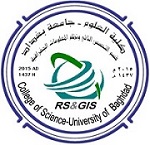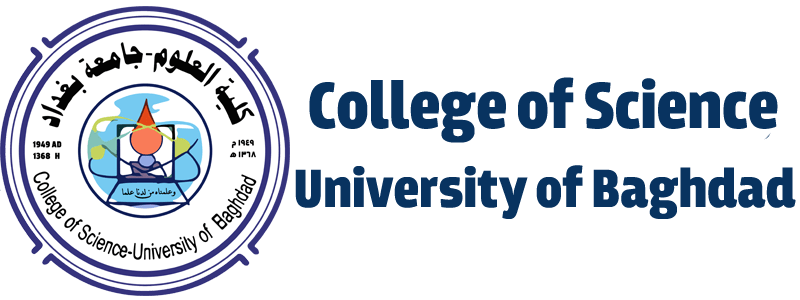About the Department of Remote Sensing and GIS

It is one of the scientific departments that were created this year 2015 in the College of Science / University of Baghdad. It is considered the only department in Iraq that prepares primary cadres in the field of remote sensing, processing and analysis of images and digital satellite and geoinformatics data. The idea of creating it came in response to the requirements of the labor market and the intense desire and urgent need. Such a specialization is created due to the need of various state institutions for such modern specializations, as this department combines in its vocabulary the departments of earth sciences, physics, and computers, as well as the departments of civil engineering and surveying engineering, in addition to the concepts of remote sensing and processing and analysis of digital images.
Department vision:-
The vision of those in charge of managing the department is to strive for the department to be the first choice for university students accepted into the College of Science, as well as for those interested in the field of remote sensing and spatial information systems, by providing a positive academic environment aimed at providing distinguished education and programs that focus on scientific research in addition to developing… Students’ scientific capabilities, through preparing a comprehensive and advanced study plan that keeps pace with the requirements of the labor market and focuses on remote sensing technology, geographic information systems, software, Internet applications, and databases.
Department message:-
Providing qualified, effective and specialized outputs in the field of remote sensing and spatial information systems with a high level of theoretical knowledge and the ability to apply actual practical applications of remote sensing activities to keep pace with the needs of the labor market.
Department objectives:-
– Building the student’s personality and developing his scientific and research capabilities in a distinguished scientific manner in the field of remote sensing, geographic information systems and its applications.
– Raising the level of higher education and scientific research and linking it to teaching and the needs of the local market, as well as disseminating knowledge and enhancing research cooperation with local, regional and international institutions.
– Providing students with the specialized knowledge and applied skills necessary to enable them to use modern technological means by offering various academic contexts in remote sensing and geographic information systems at the level of preliminary and postgraduate studies to combine excellence, modernity, and response to the needs of the local market, as the department prepares students technically by focusing on Practical and applied aspects by linking the student with scientific and practical knowledge in the field of remote sensing, spatial information systems and their applications, and everything new in this field by providing an integrated and interactive environment, which enhances the competition of graduates in obtaining appropriate job opportunities.
– Linking theoretical presentation and practical application in the field of remote sensing and spatial information systems, and integrating the student in both fields together to obtain the desired benefit.
– Contributing to providing state departments in the public and private sectors with national cadres specialized in the field of remote sensing and spatial information systems. Preparing specialists in the topics of remote sensing and digital processing to provide state institutions with the necessary expertise and skills from those holding advanced degrees in this field.
– Expanding applied research studies to keep pace with progress in these specializations, given the distinct interest these technologies constitute in the countries of the civilized world currently.
– Focus on giving graduate students the concepts of representing and analyzing spatial elements, in addition to how to work with digital geographic data and geographic information systems.
At the same time, focusing on how to deal with general geographic problems in society and the environment, using geographic information systems.
The department’s connection to the college’s goals and mission:
The College of Science at the University of Baghdad aims to qualify students enrolled in basic sciences in many specializations within its nine scientific departments, represented by the Department of (Physics, Chemistry, Life Sciences, Astronomy, Earth Sciences, Computer Sciences, Mathematics, and Biotechnology, and finally the Department of Remote Sensing and Geographic Information Systems, which was created in 2015) in addition to Research units with a focus on quality through modern and advanced curricula based on authentic scientific theories and practical applications related to the Iraqi environment, which seek to supply our dear country with its need for specialists in various fields.
Since the specialization of remote sensing and geographic information systems has become one of the most prominent specializations that many universities in developed countries are interested in, therefore, it is natural for the College of Science to seek – within the framework of its development plans – to establish a department for remote sensing and spatial information systems, while ensuring that it is linked to the college’s goals and mission. To achieve this, it is decided that the department will include new scientific curricula that derive their components and roots from the actual requirements of the labor market and the needs of the Iraqi market, with interest in developing these curricula in a way that meets the needs of production and service business institutions and keeps pace with local and global changes, most notably the continuous development in the field of informatics and the expansion of the services sector.
– Description of the graduate
The title or job description for a graduate of the Department of Remote Sensing and Geographic Information Systems is: (Geospatial data analyst) The graduate of the Department of Remote Sensing Sciences and Geographic Information Systems will acquire the following skills: Scientific knowledge and skills that qualify him to work in many fields that enable him to deal with the uses of the land and its resources in an optimal way, which meets the requirements of society and the academic and applied labor market in the private and public sectors, in addition to developing skills in the field of remote sensing and theoretical and scientific geographical information systems for the purpose of conducting research in this field. field and obtaining postgraduate degrees (Master’s and PhD) in the specializations of remote sensing sciences and geographic information systems. Graduates are able to gain familiarity with qualifying backgrounds in the field of information bases and in the ways and means of applied uses of remote sensing technology and geographic information systems, and to acquire skills in using modern technologies and employing them in fields of specialization. The department’s graduates have the ability to develop research plans in the field of remote sensing applications and geographic information systems that are of interest to society, reflect the satisfaction of its immediate needs, and provide solutions to its current problems and future programs. Graduates are able to conduct complex analysis of spatial and descriptive data and arrive at modeling of the studied situation. It consists of using satellite data and using aerial images to interpret, study and analyze various phenomena.

